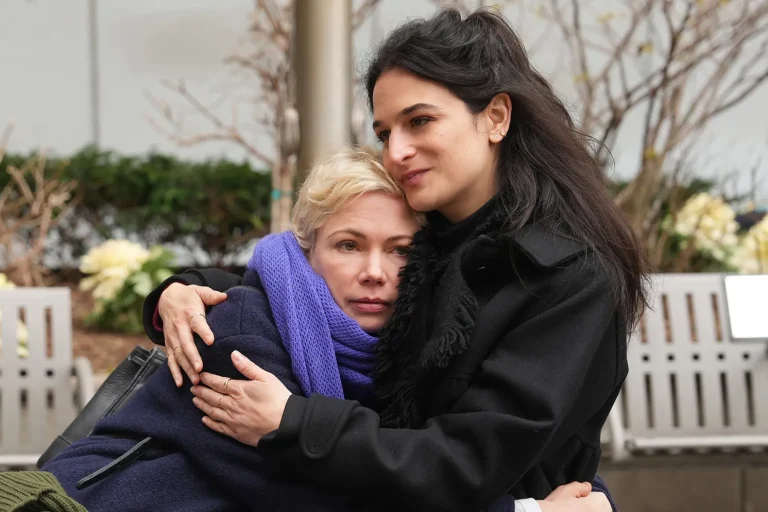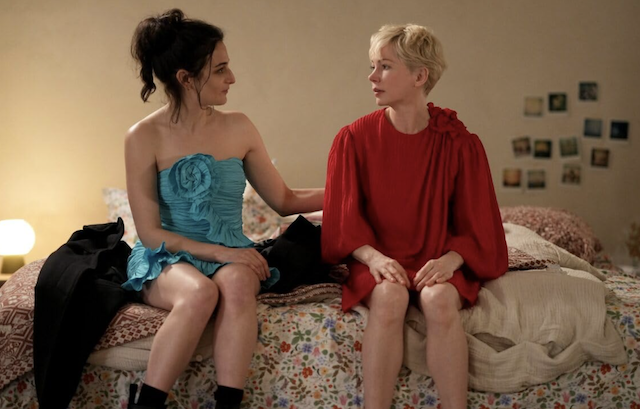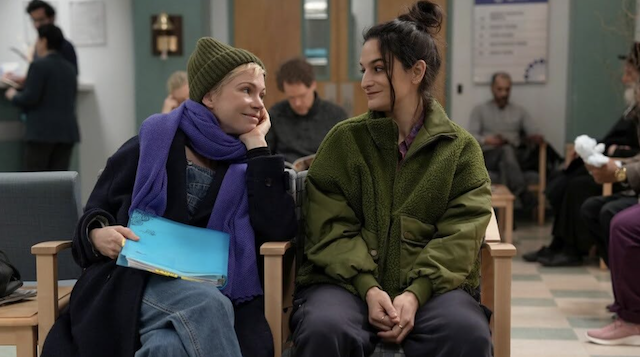
@Courtesy of FX
Dying For Sex : A woman diagnosed with metastatic breast cancer ends her 13-year marriage in order to explore herself and her sexuality before her death.
Created by: Kim Rosenstock, Elizabeth Meriwether
Producers: Shannon Murphy, Kim Rosenstock, Katherine Pope, Hernan Lopez, Aaron Hart, Jen Sargent, Marshall Lewy, Leslye Headland, Nikki Boyer, Elizabeth Meriwether
Cast : Michelle Williams, Jenny Slate, Rob Delaney, David Rasche, Esco Jouléy, Jay Duplass, Kelvin Yu, Sissy Spacek
April 4, 2025

@Courtesy of FX
Press Conference with Actors Michelle Williams, Jenny Slate, Creators Elizabeth Meriwether, Kim Rosenstock & Executive Producer Shannon Murphy
Q: Can you talk about how you researched the right music?
Elizabeth Meriwether: Our composer, Ariel Marx, was organically part of the process. The tone of the show is complicated and wonderful. We wanted it to feel full of life and light but also not be afraid to go to the darker places. We were so proud of that score, we worked really hard to get it to that place. We talked with Maggie Phillips, our music supervisor, about themes like breath and voice, things that were thematically resonant in the show. She just took them and ran with them in this amazing way.
Q: Female sexuality is a topic that most people veer away from. What did encourage you to embrace this exploration and does it reflect a new empowerment for women?
Shannon Murphy: Definitely. Having mainly a female team at the helm, we’re watching a lot of stories that are written and directed by women, so the female gaze is much stronger on the sexual experience, which is very different to the male experience. The men’s is often more like a straight line heading towards arousal, and it happens scientifically in about 30 seconds to two minutes.
Whereas for women, it’s more of a wave and it’s about 35 minutes. In this particular project, we had the wonderful opportunity to look at many different forms of kink and sexuality and desire. It wasn’t just about the end goal of ejaculation in any way, it was about so many other levels of intimacy and connection. At the moment in the world, that’s something we’re all really craving. It is important to be telling more female stories in terms of desire and sexuality.
Q: How has this role changed your view on death?
Michelle Williams: There is a way Molly dies like she lives, she is trying in these last months to find out how to be both receptive and also in charge. When you get the information, then you can live inside of the information. It’s when the information is kept away from you that you enter a state of confusion and powerlessness.
You can construct it in your own way, death itself might be a longer question. The idea of actually being able to bring it into your life, having a consciousness of your own mortality. I think about death consciousness as a way for life fulness.
Q: How did you work in order to find the right balance between the drama of the main character and the funny side and the comedy in the series?
Kim Rosenstock: Both Liz and I are comedy writers, it’s where we started out. We worked together on Liz’s show New Girl for a long time, we always have some impulse inside of us to look for comedy, that’s how we are trained. But the joy with this story was that it is so many things, not just one. We were constantly looking at the balance that we’re striking. Looking at that more than at genre.
Elizabeth Merweather: We could not have done it without actors that could do that. All of them immediately got it and jumped in and were able to go from heart-wrenching scenes into literal fart jokes. It’s something really incredible. That’s my favorite tone, it’s what opens me up to the darker things, if you want to laugh and then cry. We’re so lucky to work with these actors.

@Courtesy of FX
Q: What made you decide to participate in this show, not only as a star, but also as the executive producer?
Michelle Williams: IWe’ve been talking about it for so long, when I first heard about the show It was just a pilot episode. I thought it was unlike anything I’d ever seen, I didn’t really know what I could relate it to and that’s so exciting because it was asking something of me that was new, unusual.
I haven’t seen a representation of this deep, passionate friendship. We started this conversation, we were so engaged in this, and we were on our road to making this. And then I got pregnant. So I quieted it down for about a year and a half but then we picked it back up.
We had already formed this partnership built up on a foundation of love and faith and trust and respect. This was a community that I really wanted to be a part of. The idea that you can also make a hospitable work environment for everybody to come and do their best. Those are the things that really excite me to go to work.
Q: Without giving too much away, was there a scene during the shooting that has been particularly challenging in an emotional or in a physical way?
Jenny Slate: I don’t want to spoil anything of course, but Molly has much more medical equipment as she becomes more sick and she becomes frail. I don’t think I’ve ever loved hospitals. I’m lucky enough to not have had to think about that very much, I was surprised by my own personal discomfort around the equipment. I was really frightened. I shouldn’t be scared at work. It’s acting. This isn’t happening to me.
It was more like a really notable moment where I was using this in acting. You should use the energy that’s in you, the perceptions that you have, and make sure that they flow through the character. That’s what the people see is the performance, that energy as it is projected out through the character.
It was a moment for me where I had permission to hold on to my fear and refine it into something else. It was new for me, it was scary, I was basically experimenting with that. A lot of what we were doing was existing in some new ground. It was a challenging day. It’s been a really great experience so far. The center of our story is about not rejecting complexity and being able to tolerate the different strands of our experience, being able to look at the whole tapestry, the whole picture, and that is the reward.
If you like the press conference, share your thoughts below!
Check out more of Adriano’s articles.
Here’s the trailer of Dying for Sex:

